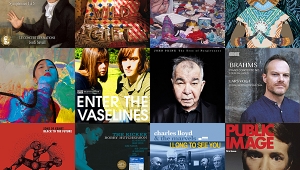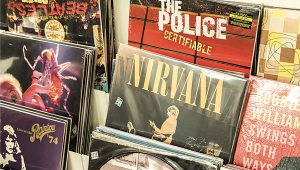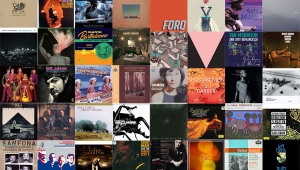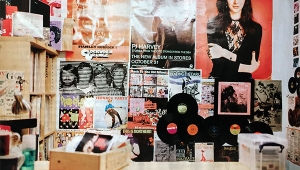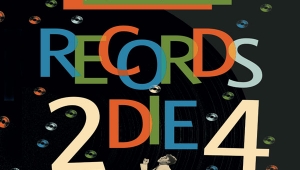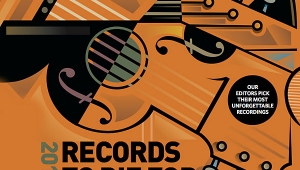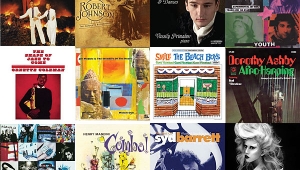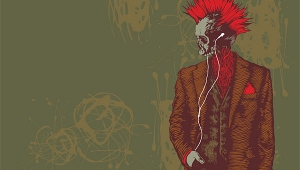| Columns Retired Columns & Blogs |
2000 Records to Die For Page 8
Paul Messenger
MASSIVE ATTACK: Blue Lines
Wild Bunch WBRCD1, Virgin 7 86228 2 (CD, also originally released on LP). 1991. Massive Attack, Jonny Dollar, prods., mix. ADD TT: 45:09
Today's dance-music genres seem to be becoming increasingly ephemeral, disposable, and self-referential, but Massive Attack's handful of albums provide a soundtrack to the 1990s that stand out as beacons of class and originality. Usually referred too as "trip-hop," MA's music has only a passing resemblance to hip-hop, rap, big beat, drum'n'bass, and other dance styles. Smooth, subtle, and fundamentally laid-back, this is one for the chill-out room—to put your feet up, relax into the groove, and actually get into listening to music that, by pop-music standards, is unusually well crafted.
CHRISTY MOORE: Live (at The Point)
Christy Moore, vocals, guitars, bodhran
Grapevine/PolyGram GRALP 203 (5 022769 391620, LP), GRACD 203 (5 022769 691621, CD). 1994. Christy Moore, prod.; Walter Samuel, eng., mix; John Donohoe, eng.; Ray Staff, mix. AAA/AAD? TT: 55:57
I don't regard myself as a particular fan of folk music, or ethnic music in general, but I've developed a very strong enthusiasm for the music of Irish minstrel Christy Moore. His career stretches back for decades, and this comes through both in his stagecraft and in his ability to work with a live audience. Of a long string of albums going back 30-odd years, Live (at The Point) (The Point is Dublin's premier venue) is my favorite, followed closely by its immediate predecessor, Smoke and Strong Whiskey. Both are exceptionally well recorded, Live tending toward the dry and thin, while Strong Whiskey has a rich, fat sound. I love the atmosphere of a genuinely live recording and the tension this brings to a performance, though some of the performer/audience repartee gets a bit tiresome when you've heard it a hundred times, and some of the humor in the songs (eg, the exploits of the Irish soccer team) has passed its sell-by date.
MONTE WARDEN: Monte Warden
Watermelon CD1015 (CD). 1993. Dave McNair, prod., eng.; Mas Palermo, prod.; Brian Gardner, eng. AAD? TT: 35:54
Monte Warden must tire of the endless comparisons to Buddy Holly, but he brought them on himself with this sweet'n'snarly collection of infectious roots-rock and country, released on here-again, gone-again Watermelon Records. Using tried and true rhymes about stars, heartbeats, dreams, eyes, the skies above, and the like, all wrapped around basic, ever-effective, strummed rock-guitar chords and hooks, Warden resurrects the rock'n'roll that was once a voice of exuberant innocence—without sounding trite or hackneyed.
MISSISSIPPI JOHN HURT: Today!
Vanguard VMD-78220 (CD). 1966. Patrick Sky, prod. AAD? TT: 43:53
In the context of today's music world, Mississippi John Hurt makes no sense. He was an old man singing old country blues and playing an old acoustic guitar. His three-finger, bass-over-rhythm picking style was simple and elegant. His warm voice was unhurried and unsentimental. Even when Hurt sang "dirty" blues, as he does on Today! in "Candy Man," his delicate pluckings on acoustic guitar and understated vocal phrasing imbue it with stateliness. This is music to be relaxed into: one man's voice and one man's guitar for a quiet, late night or a hot afternoon when you're as unlikely to move as a cool breeze is to happen by.
THE BEATLES: Revolver
Capitol CDP 7 46441 2 (CD). 1966. George Martin, prod.; Geoff Emerick, eng. AAD. TT: 34:59
Imagine a 12-year-old kid weaned on mid-'60s AM radio unwrapping this baby and putting it on his parents' record player with the 10-year-old needle. Who cared about the sound quality emanating from the tinny speaker (yes, one speaker for the cheaper-priced "monophonic microgroove recording")? Bigger than any shot-heard-'round-the-world since the JFK assassination, Revolver prepared me for a life of fascination with unorthodox musical colors, shapes, textures, and styles. I still get chills listening to John muse on the mind-blowing "Tomorrow Never Knows" (one of my all-time favorite Beatles tunes), Paul wail on the horn-riffed "Got to Get You Into My Life," George espousing love on the sitar- and tabla-drenched "Love You To," and Ringo happy-go-luckying his way through the jaunty fantasy of "Yellow Submarine." To this day, I never tire of spinning Revolver, the classic album that made me hunger to swing open the doors and explore new musical vistas.
OLIVER NELSON: The Blues and the Abstract Truth
Oliver Nelson, alto & tenor sax; Eric Dolphy, alto sax, flute; George Barrow, baritone sax; Freddie Hubbard, trumpet; Bill Evans, piano; Paul Chambers, bass; Roy Haynes, drums
Impulse! IMPD-154 (CD). 1961/1995. Creed Taylor, prod.; Rudy Van Gelder, eng.; Michael Cuscuna, reissue prod. AAD. TT: 36:35
Jazz in the late '50s and early '60s was golden. In 1959, John Coltrane recorded Giant Steps and Miles Davis offered Kind of Blue, while Ornette Coleman shocked with The Shape of Jazz to Come in 1960. A year later, Oliver Nelson recorded The Blues and the Abstract Truth. While saxophonist-composer-arranger Nelson may not figure in the top echelon of jazz artists, this album is one of the idiom's best. Not only did Nelson enlist magnificent sidemen—including Eric Dolphy and Freddie Hubbard, and the stellar rhythm section of pianist Bill Evans, bassist Paul Chambers, and drummer Roy Haynes—he also premiered two of his greatest compositions: the much-heralded and oft-covered "Stolen Moments," here delivered as nine minutes of pure bliss; and the rousing "Hoe-Down," as fun and sophisticated an uptempo number as you're likely to hear. (XVII-2)
MASSIVE ATTACK: Blue Lines
Wild Bunch WBRCD1, Virgin 7 86228 2 (CD, also originally released on LP). 1991. Massive Attack, Jonny Dollar, prods., mix. ADD TT: 45:09
Today's dance-music genres seem to be becoming increasingly ephemeral, disposable, and self-referential, but Massive Attack's handful of albums provide a soundtrack to the 1990s that stand out as beacons of class and originality. Usually referred too as "trip-hop," MA's music has only a passing resemblance to hip-hop, rap, big beat, drum'n'bass, and other dance styles. Smooth, subtle, and fundamentally laid-back, this is one for the chill-out room—to put your feet up, relax into the groove, and actually get into listening to music that, by pop-music standards, is unusually well crafted.
I've picked Blue Lines because it came first and was enormously influential, but the subsequent Protection and the most recent, the altogether darker Mezzanine, deserve just as close attention, and might be easier to track down. The "band" is a flexible unit, varying personnel from track to track around the songwriting hard core of "Daddy" G. Marshall, A. "Mushroom" Vowles, and R. "3D" del Naja, though there are lots of guest appearances. (Neneh Cherry is credited on "Hymn of the Big Wheel.")
The sheer variety of the music here makes it difficult to pin down a style or pick favorite tracks. The heavyweight "Unfinished Sympathy" is the album's widely acknowledged "classic," but I just love the cheeky backbeat that drives "Daydreaming" along at a beautifully purposeful walking pace—a real truckin' track for the '90s. Nine years on, Blue Lines remains fresh and fun musically, and that alone justifies an "R2D4" appearance.
CHRISTY MOORE: Live (at The Point)
Christy Moore, vocals, guitars, bodhran
Grapevine/PolyGram GRALP 203 (5 022769 391620, LP), GRACD 203 (5 022769 691621, CD). 1994. Christy Moore, prod.; Walter Samuel, eng., mix; John Donohoe, eng.; Ray Staff, mix. AAA/AAD? TT: 55:57
I don't regard myself as a particular fan of folk music, or ethnic music in general, but I've developed a very strong enthusiasm for the music of Irish minstrel Christy Moore. His career stretches back for decades, and this comes through both in his stagecraft and in his ability to work with a live audience. Of a long string of albums going back 30-odd years, Live (at The Point) (The Point is Dublin's premier venue) is my favorite, followed closely by its immediate predecessor, Smoke and Strong Whiskey. Both are exceptionally well recorded, Live tending toward the dry and thin, while Strong Whiskey has a rich, fat sound. I love the atmosphere of a genuinely live recording and the tension this brings to a performance, though some of the performer/audience repartee gets a bit tiresome when you've heard it a hundred times, and some of the humor in the songs (eg, the exploits of the Irish soccer team) has passed its sell-by date.
But there are still plenty of songs here that will stand up on their own for years to come. Christy's a great performer but an even better songwriter, especially at the top of his form—which is usually when he's having a go at the English. His wit can be as sharp and barbed as anything Dylan wrote, and he knows how to spin a yarn with an effortlessness that comes from three decades on the road, and an Irishness that makes you want to head for the Emerald Isle.
![]()
Michael Metzger
MONTE WARDEN: Monte Warden
Watermelon CD1015 (CD). 1993. Dave McNair, prod., eng.; Mas Palermo, prod.; Brian Gardner, eng. AAD? TT: 35:54
Monte Warden must tire of the endless comparisons to Buddy Holly, but he brought them on himself with this sweet'n'snarly collection of infectious roots-rock and country, released on here-again, gone-again Watermelon Records. Using tried and true rhymes about stars, heartbeats, dreams, eyes, the skies above, and the like, all wrapped around basic, ever-effective, strummed rock-guitar chords and hooks, Warden resurrects the rock'n'roll that was once a voice of exuberant innocence—without sounding trite or hackneyed.
Ballads like "'Til She Walked In," "Just to Hear Your Voice," "Everyday We Fall in Love," and "All I Want is You" revisit the adorations and aches of first loves and first rejections, presented in spare arrangements and restrained vocals that prevent melodrama from ever taking over. When Warden kicks up the tempo on "Give My Heart a Break," "Feel Better," "All I Want is You," and "Car Seat," he keeps it clean and simple, allowing the urgency of the backbeat and his sugary growls to grab and shake you. It's rock'n'roll as it was once meant to be—and worth the effort to hunt down this elusive disc.
MISSISSIPPI JOHN HURT: Today!
Vanguard VMD-78220 (CD). 1966. Patrick Sky, prod. AAD? TT: 43:53
In the context of today's music world, Mississippi John Hurt makes no sense. He was an old man singing old country blues and playing an old acoustic guitar. His three-finger, bass-over-rhythm picking style was simple and elegant. His warm voice was unhurried and unsentimental. Even when Hurt sang "dirty" blues, as he does on Today! in "Candy Man," his delicate pluckings on acoustic guitar and understated vocal phrasing imbue it with stateliness. This is music to be relaxed into: one man's voice and one man's guitar for a quiet, late night or a hot afternoon when you're as unlikely to move as a cool breeze is to happen by.
Whether it's the suggestive ode to Maxwell House in "Coffee Blues," the story of murder in "Louis Collins," the expectant redemption of "Beulah Land," or the jubilant yearning of "Corrinna, Corrinna," Hurt shapes the lyrics with uncommon ease and palatable warmth, making them into song-stories sung by a smiling grandfather of the blues. His graceful music makes no sense in today's world. That could be its greatest charm.
![]()
Dan Ouellette
THE BEATLES: Revolver
Capitol CDP 7 46441 2 (CD). 1966. George Martin, prod.; Geoff Emerick, eng. AAD. TT: 34:59
Imagine a 12-year-old kid weaned on mid-'60s AM radio unwrapping this baby and putting it on his parents' record player with the 10-year-old needle. Who cared about the sound quality emanating from the tinny speaker (yes, one speaker for the cheaper-priced "monophonic microgroove recording")? Bigger than any shot-heard-'round-the-world since the JFK assassination, Revolver prepared me for a life of fascination with unorthodox musical colors, shapes, textures, and styles. I still get chills listening to John muse on the mind-blowing "Tomorrow Never Knows" (one of my all-time favorite Beatles tunes), Paul wail on the horn-riffed "Got to Get You Into My Life," George espousing love on the sitar- and tabla-drenched "Love You To," and Ringo happy-go-luckying his way through the jaunty fantasy of "Yellow Submarine." To this day, I never tire of spinning Revolver, the classic album that made me hunger to swing open the doors and explore new musical vistas.
OLIVER NELSON: The Blues and the Abstract Truth
Oliver Nelson, alto & tenor sax; Eric Dolphy, alto sax, flute; George Barrow, baritone sax; Freddie Hubbard, trumpet; Bill Evans, piano; Paul Chambers, bass; Roy Haynes, drums
Impulse! IMPD-154 (CD). 1961/1995. Creed Taylor, prod.; Rudy Van Gelder, eng.; Michael Cuscuna, reissue prod. AAD. TT: 36:35
Jazz in the late '50s and early '60s was golden. In 1959, John Coltrane recorded Giant Steps and Miles Davis offered Kind of Blue, while Ornette Coleman shocked with The Shape of Jazz to Come in 1960. A year later, Oliver Nelson recorded The Blues and the Abstract Truth. While saxophonist-composer-arranger Nelson may not figure in the top echelon of jazz artists, this album is one of the idiom's best. Not only did Nelson enlist magnificent sidemen—including Eric Dolphy and Freddie Hubbard, and the stellar rhythm section of pianist Bill Evans, bassist Paul Chambers, and drummer Roy Haynes—he also premiered two of his greatest compositions: the much-heralded and oft-covered "Stolen Moments," here delivered as nine minutes of pure bliss; and the rousing "Hoe-Down," as fun and sophisticated an uptempo number as you're likely to hear. (XVII-2)
- Log in or register to post comments

